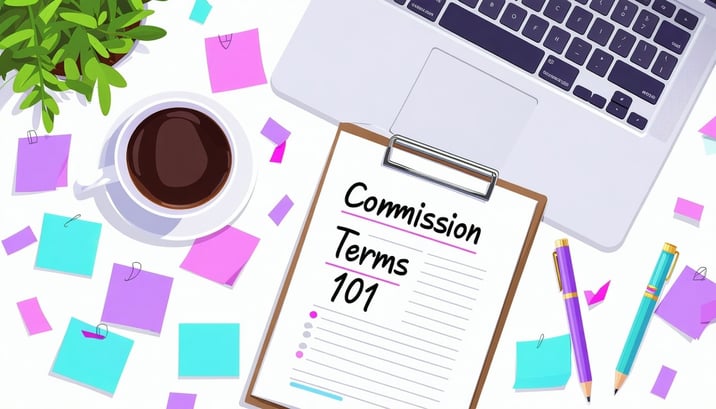Are you navigating the complex world of insurance commissions for the first time?
Feeling overwhelmed by terms like "overrides" and "chargebacks"?
You're not alone. Many new agency owners and commission accountants find themselves puzzled by industry jargon. Understanding these terms is crucial for accurate tracking, compliance, and maximizing revenue.
In this blog, we'll break down 10 essential commission terms to help you build a solid foundation in commission management.
1. Advance Commission
An advance commission is a payment given to an agent before the actual premium is collected. It's based on the expectation that the policy will remain active for a certain period. If the policy lapses early, the agent may need to repay a portion of the advance.
Example: An agent receives a $1,200 advance for a policy expected to last 12 months. If the policy cancels after 6 months, the agent might need to repay $600.
2. Chargeback
A chargeback occurs when an agent must return a portion of their commission due to policy cancellations, non-payments, or other issues. It's essentially a reversal of previously paid commissions.
Example: If a client cancels their policy within the free-look period, the agent's commission for that sale may be charged back.
3. Override Commission
An override commission is additional compensation paid to managers or supervisors based on the sales performance of their team members. It's designed to incentivize leadership and team development.
Example: A sales manager earns a 2% override on all sales made by their team, encouraging them to support and train their agents effectively.
4. Vesting
Vesting refers to the process by which an agent earns the right to receive commissions, especially renewal commissions, even after leaving the agency. Vesting schedules vary by company and contract terms.
Example: An agent becomes fully vested after 5 years, meaning they continue to receive renewal commissions even if they leave the agency.
5. Residual Commission
Residual commissions are ongoing payments made to agents for policies that remain active over time. They provide a steady income stream and reward agents for maintaining long-term client relationships.
Example: An agent earns a 5% residual commission annually for each year a client's policy remains active.
6. Renewal Commission
Renewal commissions are payments made to agents when clients renew their insurance policies. They incentivize agents to maintain strong relationships and ensure client satisfaction.
Example: An agent receives a 10% commission each time a client renews their annual health insurance policy.
7. Hierarchy
In commission structures, a hierarchy defines the levels of agents and managers within an organization. Commissions are often distributed based on this structure, with higher levels earning overrides from the sales of those below them.
Example: A regional manager earns overrides from district managers, who in turn earn overrides from individual agents.
8. Split Commission
A split commission occurs when two or more agents share the commission from a single sale. This often happens in collaborative sales efforts or when transitioning clients between agents.
Example: Two agents collaborate on a sale and agree to split the 20% commission equally, each receiving 10%.
9. Commission Reconciliation
Commission reconciliation is the process of verifying that commissions paid match the expected amounts based on sales and agreements. It's essential for identifying discrepancies and ensuring accurate payments.
Example: An agency compares carrier commission statements with internal records to confirm all expected commissions were received.
10. Draw Against Commission
A draw against commission is a payment made to an agent as an advance on future commissions. If the agent's earned commissions exceed the draw, they receive the difference. If not, they may owe the company the unearned portion.
Example: An agent receives a $2,000 monthly draw. If they earn $2,500 in commissions that month, they receive an additional $500. If they earn only $1,500, they may owe $500 back.
Your Commission Glossary Is Just the Beginning
Understanding these terms is step one.
Putting systems in place to manage them is step two.
Comissio helps health insurance agencies like yours automate commission tracking, stay organized across multiple carriers and agents, and get clear, real-time visibility into who’s earning what.
Ready to stop relying on spreadsheets and start gaining control over your commissions?
Schedule a Demo with Comissio Today!

.gif)

